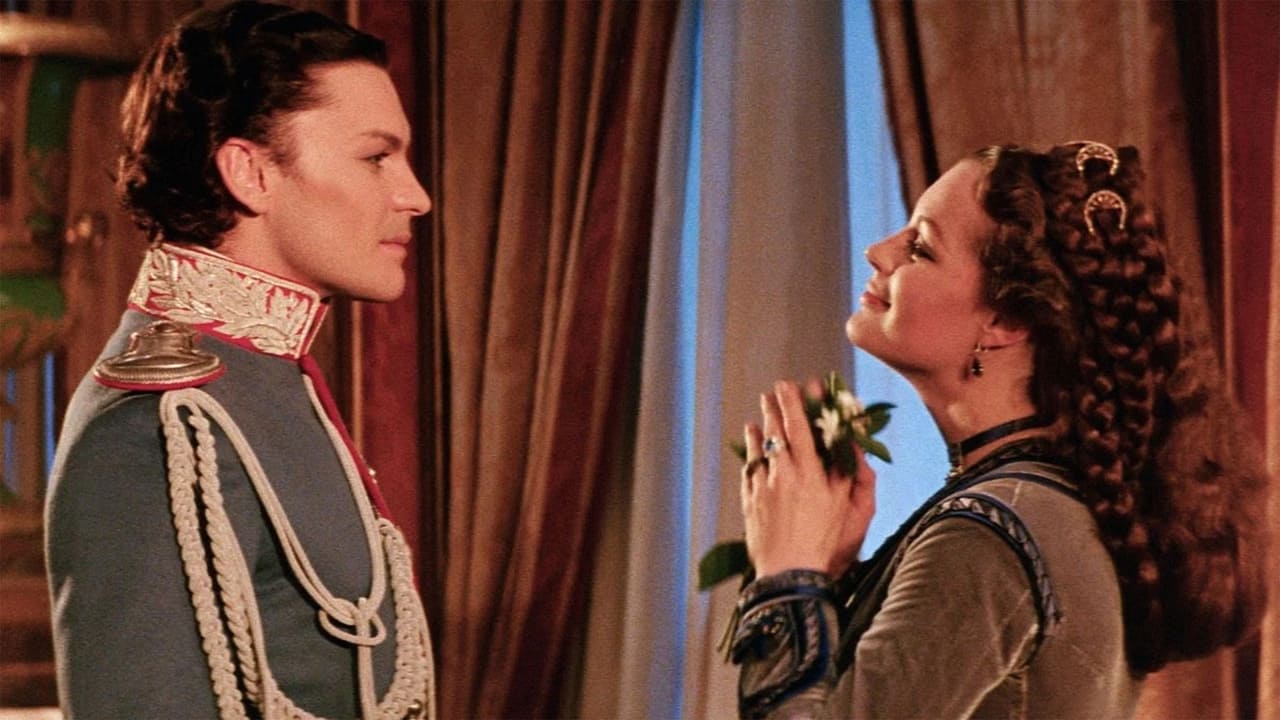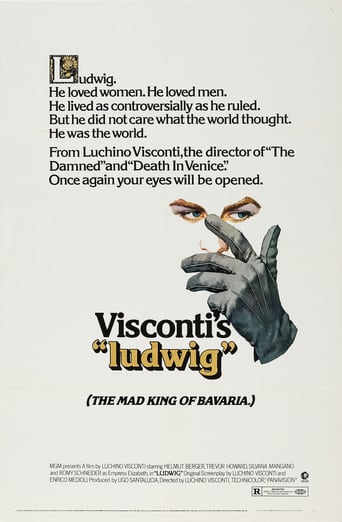



Really Surprised!
While it is a pity that the story wasn't told with more visual finesse, this is trivial compared to our real-world problems. It takes a good movie to put that into perspective.
View MoreThere are moments in this movie where the great movie it could've been peek out... They're fleeting, here, but they're worth savoring, and they happen often enough to make it worth your while.
View MoreThere are moments that feel comical, some horrific, and some downright inspiring but the tonal shifts hardly matter as the end results come to a film that's perfect for this time.
View MoreFor many many years I wanted to see this movie, a film you never get to see on TV or at a Visconti retrospective at the NFT or one of the Curzon cinemas here in London. Perhaps it is so because this film has been so much underrated by critics and public that it drags far behind the director's most famous and praised works (The Leopard, Rocco, La Terra Trema, etc). I read in a biography of the director that "Ludwig" was a mammoth project that took four production companies from different countries to put up the budget, it obsessed and consumed Visconti to the the extent of almost killing him when he suffered a stroke as a result of long working hours and too much mental strain, went well over schedule and budget and finally was taken away from the author's hands by the producers and butchered and re-edited in order to make it shorter, simpler and more viably commercial. The result was a mess almost half of the length of the original and with a lot of key scenes missing, presenting an inconsistent story full of plot holes and with characters appearing now and then from nowhere. It took several years after Visconti's death for his usual collaborators (d'Amico, Nanuzzi) to gather the missing sequences and re-edit the film into a cut as close to Visconti's idea as it could be. The result is a a DVD edition of 228 minutes. This movie, visually speaking, is with "Death in Venice" probably Visconti's most beautiful,lavish and rich in colours and small details. As to the story, I agree with other viewers on the fact that it is a bit too overlong and it drags at places and some sequences could have been shorter without the plot missing anything. But then it seems like Visconti deliberately wanted to give it that sedate pacing in order to suit the dreamlike mental state of the protagonist during his reclusion in his castles and his lapses into his own fantasy world. In order to understand better Ludwig's personality I read one of his many biographies after watching the movie for the first time, and then I watched it again, and I could appreciate better Visconti's approach to the character. I think this is a movie worth of its director, and even with its flaws and extreme length it deserves better criticism and appreciation than it unfairly got since it first came out in 1972.Helmut Berger is quite good here and has a remarkable resemblance to the real Ludwig, Romy Schneider is as beautiful as ever and the real Bavarian locations are breathtaking. The night sequence with Ludwig and Elizabeth riding in the snowy forest in the moonlight is one of the most beautiful and romantic I have ever seen in film. The cinematography alone makes "Ludwig" worth watching if you like beautiful things. Hopefully this movie has gained some appreciation and seems to be getting better reviews nowadays that it did in the past. Many call it Visconti's lost masterpiece. Although I don't think it is one of his greatest works thematically speaking, it surely stands among the most beautiful and lyrical and it is one of my favourite choices for a long winter evening.
View MoreThe life of Bavaria's 'mad' King Ludwig II might have been tailor made for the silver screen, but this mammoth 4-hour long production is recommended only to viewers with superhuman powers of endurance. A patron of the arts and an incurable romantic, Ludwig ascended to the throne in 1864 at the tender age of twenty, where he proceeded to demonstrate his political ignorance and disdain for State affairs by bleeding the treasury dry in the pursuit of pure aesthetic beauty, leading his troubled mind to finally seek refuge in a Wagnerian fantasy of bold, beautiful heroes and sturdy Valkurian maidens. The film was lavishly produced and photographed in and around the fairy tale splendor of Ludwig's Alpine castles, but despite the impressive attention to visual detail the results are (at best) uneven, alternating moments of fascinating historical drama with long stretches of undiluted tedium. A few belated but colorful scenes of royal debauchery (temper tantrums, all-male orgies, etc.) aren't enough to jump start the leaden pace, and the typically haphazard Italian overdubbing holes the film below the waterline from its very first moments.
View MoreBeing offered something common (no matter if it is a painting, a musical bit, a play or a movie) one can praise it, criticize it, evaluate it according to some standards. Yet, what happens if one encounters something elaborate, something that knows no limits of standardized conventions, something that follows no paths of shallow commonness? This seems to be the case with a few pearls of artistic cinema, including LUDWIG (1972) by great aristocrat-director Luchino Visconti (1906-1975). As Visconti's most underrated work, this is the film that I have owned for 5 years, the film I have seen a considerable number of times; yet, the film I have found so hard to fully understand. Nevertheless, a rhetorical question seemed to help me in such a lack of understanding: is it possible to fully understand a human being, is it possible to fully understand oneself? The similar idea appears to be hidden in this film.LUDWIG, as it is well known, tells the story of the 'eccentric' (for some) or 'fairy tale' (for others) king of Bavaria, Ludwig II (1845-1886) who is now famous mostly among tourists who visit the elaborate, almost dreamlike castles in the southern Land of Germany. While getting to know his psyche, we realize that Ludwig was an extraordinary psyche, someone filled with contradictions, absorbed in struggling for the sublime beauty, living seriously within the illusive walls of an unfulfilled reality. Meanwhile, Ludwig, with certain characteristics, appeared to be 'much ahead of his time.' Visconti, having deeply analyzed the phenomenon of that man, not only develops these aspects but brings them back to life by means of three miracles on screen: flawless direction, breathtaking sets and talented cast.Although some people may detest Mr Berger for some opinions expressed in public, we cannot deny the fact that the film owes much to him. Berger appears to give one of the most sublime performances in the leading role. He makes LUDWIG a genuine analysis, a must see for all movie buffs by portraying a unique, sophisticated man threatened by fears, filled with dense emotions, carnal pleasures, suffering from the quest for the blissful and illusive reality; an eccentric experiencing the storms of mind, an artist-dreamer gradually disillusioned by the mute world of contemporaries. How modern and, yet, how universal the character appears to be in his search for the individual world! All this is so well manifested that the viewer is not merely watching, being an observer of the character's hard states of mind: he/she is experiencing a slow, perhaps sometimes tedious, but exceptionally claustrophobic journey with the main character; yet not so much the journey of tear-jerking sweet compassion but something far more than this, something revealed in the self-reflection. Berger and Visconti allow us to experience this journey into the mind of a human being that aims at being uncommon rather than decent. Gradually, we are led into the strange world of the king and, unexpectedly, into the unknown perceptions that we ourselves own. We get to know Ludwig as the feminine moon rather than the masculine sun. He is not ready to make love to women because his feelings occur to be the personally peculiar inventions of his mind. Therefore, he turns to homosexual pleasures being, in this way, a reflection of Visconti himself. Extraordinary images of lavish elegance, subtle imagination throughout the film besides the aforementioned Berger's exceptional talent and Visconti's excellent direction help us in this journey.When we consider other performances, Romy Schneider seems to be the other 'treasure' of the film...not as beautiful yet saccharine Sissi but as delicious, disillusioned, mature Empress Elizabeth. Her strongest point here is the cold attractiveness. She is the absolute female beauty, the 'dove' Ludwig is impressed by; yet, a woman he finally does not let into his castle. Although I very much appreciate her role in Marischka's SISSI trilogy (1955, 1956, 1957), I must admit that here, at last, under the direction of great maestro whom she highly respected, Romy was able to interpret Elizabeth in the accurate manner. She perfectly portrays a very independent yet contradictory character who is already aware of the fact that history forgets us and the bitter conclusion that the world does not care. Her appearances in the movie are astounding including her looks, her acting and her wardrobe, mostly black which is inspired by the later photos of the Kaiserin Von Oesterreich.The great performances are also given by the supporting cast, in particular Trevor Howard as king Ludwig's idol-composer Richard Wagner with his destructive manners, extravagant nature yet powerful illusion resembled in 'a figure' so much glorified and appreciated within the mind of the king. I also liked Silvana Mangano as Cosima, Wagner's wife whom he offers an unusual Christmas gift in the memorable scene...However, it would be highly unjust to claim that only performance make the movie an elaborate cinematic production. It is much more, it is foremost VISCONTI, his unique style focused on single important details and the entire psychology of the character's development. Besides, it is the clever script and authentic sets including Neuschweistein Castle, Herrenchiemsee, Bad Ischl, etc. It is, finally, the musical score that appears to be beautifully fitted within particular scenes that one cannot omit. Therefore, any shortened version does not make sense at all as Wolfram Schütte nicely put it (1975) referring to omissions: "Who has seen the film in Germany has, in fact, never seen it." Highly recommended movie and a must DVD release! 9/10"Du Warst Ein Maerchenkoenig, Die Freiheit Das War Dein Tron...Koenig Ludwig, Wir Vergessen Dich Nicht" (you were a fairy tale king and freedom was your throne...king Ludwig, we won't forget you). So says a German 'Lied' (song) by singer Bianca. Utopian as it may seem, isn't that, after all, something we really don't forget?
View MoreSo much could have gone wrong with this follow-up to Visconti's deeply flawed "Morte a Venezia": the treatment of Ludwig II's (dream-)life could have resulted in hokey mystification; Helmut Berger's impersonation could have been badly influenced by the actor's frequently mannered performances; re-casting Romy Schneider as Sissi could have been a mere folly; and stretching the running-time to four hours could have been the nail in the coffin.But miraculously, it all works: Visconti's elegant and empathic direction finds the right biographical tone; Berger has never been better; Romy is simply dazzlingly charming and witty in her second, much more mature approach to the Sissi character; and (except for the bumpy last hour) there's not a single unwanted scene.Plus, Trevor Howard's Richard Wagner is a real treat; the other supporting actors are uniformly excellent; Ludwig's dormant homosexuality is subtly handled; the soundtrack is a marvel and visually, it's Visconti's most impressive work.9 out of 10 moonlit horse rides
View More